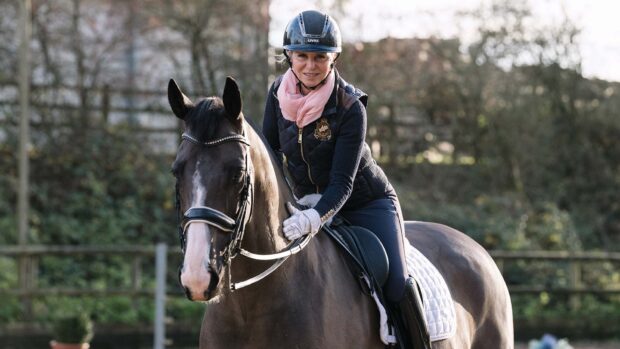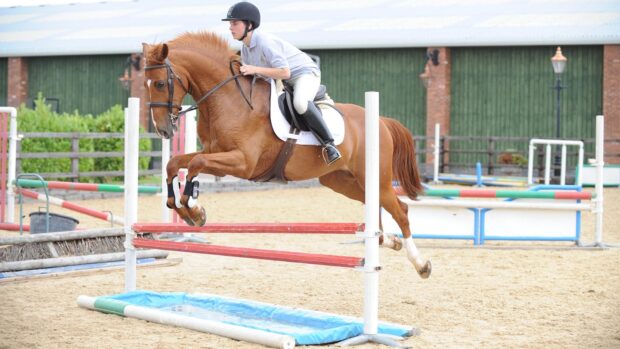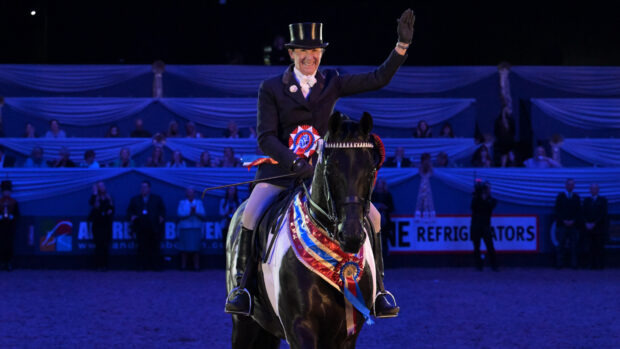We all start out our riding ventures in the company of other people and horses. Having the confidence to ride alone isn’t a given. Whether we’re used to the riding school, coaches, or having our parents and siblings around, it can feel like a big deal when you first start riding without the support of other people.
There are also riders who may have spent years never doubting their confidence to ride alone, but perhaps an incident or traumatic event has scuppered their self-belief. And let’s not forget, our horses, being herd animals, have to build their own confidence to go out without other equines alongside.
However, it is very limiting not to be able to ride on our own. We cannot always have a coach barking out instructions and correcting every mistake. There aren’t always people to ride with at a convenient time. Even though it may be fun to go out with others, it opens up many more opportunities and develops skills to have solo riding in your repertoire.
Out hacking, you’ll be helping your horse be more independent, while in the school, you’ll be able to focus single-mindedly on honing your technique. Sometimes, you can learn a lot more working through exercises that a coach has previously set you, because you have the time to practise without pressure. It gives you the chance to try things out without being concerned about “getting it wrong”.
Plus, once you’re all set, there’s sometimes nothing better than enjoying the big outdoors with just you and your horse.
Develop self-coaching
For those who struggle to know what to do in a schooling session without instruction, equestrian mental performance coach Poppy Blandford encourages them to embrace riding alone and to be their own coach.
{"content":"PHA+4oCcWW91IGxlYXJuIHNvIG11Y2ggYWJvdXQgeW91cnNlbGYgYW5kIGV4cGVyaWVuY2Ugd2hlbiB5b3XigJlyZSBtb3ZpbmcgdGhyb3VnaCB0aGUgcHJvY2Vzc2VzIGFsb25lLOKAnSBzaGUgc2F5cy4g4oCcT2YgY291cnNlIHdvcmtpbmcgd2l0aCB5b3VyIGNvYWNoIGlzIGV4dHJlbWVseSBoZWxwZnVsLCBidXQgaWYgeW914oCZcmUgaGF2aW5nIHRvIHJpZGUgYWxvbmUgdGhlbiBieSBoYXZpbmcgYSBzZXQgc3RydWN0dXJlIHlvdSBjYW4gc3RpbGwgZ2V0IGEgbG90IG9mIGZlZWRiYWNrIHRoYXQgd2F5LjwvcD4KPHA+PGRpdiBpZD0iYXR0YWNobWVudF84OTA0MzciIHN0eWxlPSJ3aWR0aDogMTQxMHB4IiBjbGFzcz0id3AtY2FwdGlvbiBhbGlnbm5vbmUiPjxpbWcgZmV0Y2hwcmlvcml0eT0iaGlnaCIgZGVjb2Rpbmc9ImFzeW5jIiBhcmlhLWRlc2NyaWJlZGJ5PSJjYXB0aW9uLWF0dGFjaG1lbnQtODkwNDM3IiBjbGFzcz0ibGF6eWxvYWQgYmx1ci11cCBzaXplLWZ1bGwgd3AtaW1hZ2UtODkwNDM3IiBkYXRhLXByb2Nlc3NlZCBzcmM9Imh0dHBzOi8va2V5YXNzZXRzLnRpbWVpbmN1ay5uZXQvaW5zcGlyZXdwL2xpdmUvd3AtY29udGVudC91cGxvYWRzL3NpdGVzLzE0LzIwMTcvMDMvbmV3LWhoLXBsYWNlaG9sZGVyLTIwMHgyMDAucG5nIiBkYXRhLXNyYz0iaHR0cHM6Ly9rZXlhc3NldHMudGltZWluY3VrLm5ldC9pbnNwaXJld3AvbGl2ZS93cC1jb250ZW50L3VwbG9hZHMvc2l0ZXMvMTQvMjAyNS8wMy9IQUgwMC5sYl9GYXJ3YXlfZmFybV9zdG9ja19pbWFnZXNfZnV0dXJlb3duc19lbW1hX2hlcnJvZC5GQVJXQVlfRkFSTV9GVVRVUkVfT1dOU19FTU1BX0hFUlJPRDIwMjUwNDAyXzMzNDguanBnIiBhbHQ9IkJ1aWxkaW5nIGNvbmZpZGVuY2UgdG8gcmlkZSBhbG9uZS4gV29ya2luZyB0aHJvdWdoIGFuIGV4ZXJjaXNlIG9uIGNoZXN0bnV0IGhvcnNlIiB3aWR0aD0iMTQwMCIgaGVpZ2h0PSI3ODgiIGRhdGEtc2l6ZXM9ImF1dG8iIGRhdGEtc3Jjc2V0PSJodHRwczovL2tleWFzc2V0cy50aW1laW5jdWsubmV0L2luc3BpcmV3cC9saXZlL3dwLWNvbnRlbnQvdXBsb2Fkcy9zaXRlcy8xNC8yMDI1LzAzL0hBSDAwLmxiX0ZhcndheV9mYXJtX3N0b2NrX2ltYWdlc19mdXR1cmVvd25zX2VtbWFfaGVycm9kLkZBUldBWV9GQVJNX0ZVVFVSRV9PV05TX0VNTUFfSEVSUk9EMjAyNTA0MDJfMzM0OC5qcGcgMTQwMHcsIGh0dHBzOi8va2V5YXNzZXRzLnRpbWVpbmN1ay5uZXQvaW5zcGlyZXdwL2xpdmUvd3AtY29udGVudC91cGxvYWRzL3NpdGVzLzE0LzIwMjUvMDMvSEFIMDAubGJfRmFyd2F5X2Zhcm1fc3RvY2tfaW1hZ2VzX2Z1dHVyZW93bnNfZW1tYV9oZXJyb2QuRkFSV0FZX0ZBUk1fRlVUVVJFX09XTlNfRU1NQV9IRVJST0QyMDI1MDQwMl8zMzQ4LTMwMHgxNjkuanBnIDMwMHcsIGh0dHBzOi8va2V5YXNzZXRzLnRpbWVpbmN1ay5uZXQvaW5zcGlyZXdwL2xpdmUvd3AtY29udGVudC91cGxvYWRzL3NpdGVzLzE0LzIwMjUvMDMvSEFIMDAubGJfRmFyd2F5X2Zhcm1fc3RvY2tfaW1hZ2VzX2Z1dHVyZW93bnNfZW1tYV9oZXJyb2QuRkFSV0FZX0ZBUk1fRlVUVVJFX09XTlNfRU1NQV9IRVJST0QyMDI1MDQwMl8zMzQ4LTYzMHgzNTUuanBnIDYzMHcsIGh0dHBzOi8va2V5YXNzZXRzLnRpbWVpbmN1ay5uZXQvaW5zcGlyZXdwL2xpdmUvd3AtY29udGVudC91cGxvYWRzL3NpdGVzLzE0LzIwMjUvMDMvSEFIMDAubGJfRmFyd2F5X2Zhcm1fc3RvY2tfaW1hZ2VzX2Z1dHVyZW93bnNfZW1tYV9oZXJyb2QuRkFSV0FZX0ZBUk1fRlVUVVJFX09XTlNfRU1NQV9IRVJST0QyMDI1MDQwMl8zMzQ4LTEzNXg3Ni5qcGcgMTM1dywgaHR0cHM6Ly9rZXlhc3NldHMudGltZWluY3VrLm5ldC9pbnNwaXJld3AvbGl2ZS93cC1jb250ZW50L3VwbG9hZHMvc2l0ZXMvMTQvMjAyNS8wMy9IQUgwMC5sYl9GYXJ3YXlfZmFybV9zdG9ja19pbWFnZXNfZnV0dXJlb3duc19lbW1hX2hlcnJvZC5GQVJXQVlfRkFSTV9GVVRVUkVfT1dOU19FTU1BX0hFUlJPRDIwMjUwNDAyXzMzNDgtMzIweDE4MC5qcGcgMzIwdywgaHR0cHM6Ly9rZXlhc3NldHMudGltZWluY3VrLm5ldC9pbnNwaXJld3AvbGl2ZS93cC1jb250ZW50L3VwbG9hZHMvc2l0ZXMvMTQvMjAyNS8wMy9IQUgwMC5sYl9GYXJ3YXlfZmFybV9zdG9ja19pbWFnZXNfZnV0dXJlb3duc19lbW1hX2hlcnJvZC5GQVJXQVlfRkFSTV9GVVRVUkVfT1dOU19FTU1BX0hFUlJPRDIwMjUwNDAyXzMzNDgtNjIweDM0OS5qcGcgNjIwdywgaHR0cHM6Ly9rZXlhc3NldHMudGltZWluY3VrLm5ldC9pbnNwaXJld3AvbGl2ZS93cC1jb250ZW50L3VwbG9hZHMvc2l0ZXMvMTQvMjAyNS8wMy9IQUgwMC5sYl9GYXJ3YXlfZmFybV9zdG9ja19pbWFnZXNfZnV0dXJlb3duc19lbW1hX2hlcnJvZC5GQVJXQVlfRkFSTV9GVVRVUkVfT1dOU19FTU1BX0hFUlJPRDIwMjUwNDAyXzMzNDgtOTIweDUxOC5qcGcgOTIwdywgaHR0cHM6Ly9rZXlhc3NldHMudGltZWluY3VrLm5ldC9pbnNwaXJld3AvbGl2ZS93cC1jb250ZW50L3VwbG9hZHMvc2l0ZXMvMTQvMjAyNS8wMy9IQUgwMC5sYl9GYXJ3YXlfZmFybV9zdG9ja19pbWFnZXNfZnV0dXJlb3duc19lbW1hX2hlcnJvZC5GQVJXQVlfRkFSTV9GVVRVUkVfT1dOU19FTU1BX0hFUlJPRDIwMjUwNDAyXzMzNDgtMTIyMHg2ODcuanBnIDEyMjB3IiBzaXplcz0iKG1heC13aWR0aDogMTQwMHB4KSAxMDB2dywgMTQwMHB4IiAvPjxwIGlkPSJjYXB0aW9uLWF0dGFjaG1lbnQtODkwNDM3IiBjbGFzcz0id3AtY2FwdGlvbi10ZXh0Ij5Xb3JrIHRocm91Z2ggc3BlY2lmaWMgZXhlcmNpc2VzIHNvIHRoYXQgeW91ciBzZXNzaW9uIGhhcyBhIHN0cnVjdHVyZS4gQ3JlZGl0OiBFbW1hIEhlcnJvZCBQaG90b2dyYXBoeTwvcD48L2Rpdj48YnIgLz4KPC9wPgo8cD7igJxUaGUgYmlnIHRoaW5nIGlzIHRyeWluZyB0byBzdGF5IHByb2Nlc3MtZm9jdXNlZCBhbmQgdW5kZXJzdGFuZGluZyB3aGF0IHlvdeKAmXJlIGRvaW5nLiBJIGFzayByaWRlcnMgb2YgYWxsIGxldmVscywgaWYgSSB3YXMgdG8gZ2V0IG9uIHlvdXIgaG9yc2Ugd2hhdCB0aHJlZSB0aGluZ3Mgd291bGQgeW91IHRlbGwgbWU\/IEl0IG1pZ2h0IGJlIHNvbWV0aGluZyBsaWtlLCDigJhIZSBmYWxscyBvdXQgdGhyb3VnaCBoaXMgc2hvdWxkZXIgb3IgaGUgZ2V0cyB0b28gZmFzdCBvbiB0aGF0IHJlaW7igJkuPC9wPgo8cD7igJxGcm9tIHRoZXJlLCB0aGluayBhYm91dCB3aGF0IHlvdSB3b3VsZCB0ZWxsIG1lIHRvIGRvIGFib3V0IGl0LiBXaGV0aGVyIHRoYXTigJlzIGdldCBoaW0gdXAgaW4gZnJvbnQgb2YgbXkgbGVnLCBvciBzaXQgaW4gdGhlIHNhZGRsZSBhbmQgZW5jb3VyYWdlIGhpbSB0byB3b3JrIGZyb20gYmVoaW5kIOKAkyBpdOKAmXMgaGF2aW5nIGEgY2xlYXIgdW5kZXJzdGFuZGluZyBvZiB3aGF0IHlvdeKAmXJlIHRyeWluZyB0byBjcmVhdGUuPC9wPgoKPHA+4oCcV2hlbiB3ZSBoYXZlIGNsYXJpdHkgaW4gaG93IHdl4oCZcmUgc3VwcG9zZWQgdG8gZG8gc29tZXRoaW5nLCBpdCByZWFsbHkgb3BlbnMgdXAgb3VyIHBvdGVudGlhbCB0byBjb2FjaCBvdXJzZWx2ZXMu4oCdPC9wPgo8aDI+TWFrZSBhIHBsYW48L2gyPgo8cD5GaXZlLXN0YXIgZXZlbnRlciBhbmQgQkhTSSBjb2FjaCA8YSBocmVmPSIvdGFnL2dlb3JnaWUtZ29zcyIgdGFyZ2V0PSJfYmxhbmsiIHJlbD0ibm9mb2xsb3cgbm9vcGVuZXIiPkdlb3JnaWUgR29zczwvYT4gc2F5cyByaWRlcnMgc2hvdWxkIGFwcHJvYWNoIGVhY2ggc2Vzc2lvbiB3aXRoIGEgY2xlYXIgaWRlYSBtYXBwZWQgb3V0LjwvcD4KCjxwPuKAnENvYWNoZXMgd2lsbCB1c3VhbGx5IGhhdmUgYSBsZXNzb24gcGxhbiwgYW5kIGl04oCZcyBubyBkaWZmZXJlbnQgZnJvbSBhbiBpbmRpdmlkdWFsIHJpZGluZyBwb2ludCBvZiB2aWV3LOKAnSBzaGUgc2F5cy48L3A+CjxwPuKAnElmIHlvdSBrbm93IHlvdSBnbyBpbnRvIHRoZSBhcmVuYSBhbmQgZW5kIHVwIHRyb3R0aW5nIGFyb3VuZCBvbiBvbmUgcmVpbiBhbmQgcGFuaWNraW5nIGFib3V0IHdoYXQgY291bGQgaGFwcGVuLCB5b3UgbmVlZCB0byBzZXQgc29tZSBwbGFuczog4oCYSeKAmW0gZ29pbmcgdG8gcmlkZSBmb3IgMzAgbWludXRlczsgSeKAmW0gZ29pbmcgdG8gZG8gMTAgbWludXRlcyBvZiB0aGlzLCAxMCBtaW51dGVzIG9mIHRoYXQsIDEwIG1pbnV0ZXMgb2YgdGhlIG90aGVy4oCZLjwvcD4KPHA+4oCcT3IgcGxhbiB5b3VyIGV4ZXJjaXNlcy4gRm9yIGV4YW1wbGUg4oCYSeKAmW0gZ29pbmcgdG8gZG8gYSAxMG0gY2lyY2xlIGluIGV2ZXJ5IGNvcm5lcuKAmS48L3A+CjxwPuKAnEl04oCZcyBubyBkaWZmZXJlbnQgdG8gZ29pbmcgdG8gdGhlIGd5bSBhbmQgZm9sbG93aW5nIGEgcmVnaW1lIHNvIHlvdSBoYXZlIGEgcGxhbiBvZiB3aGF0IHlvdeKAmXJlIGdvaW5nIHRvIGRvIGluIHRoYXQgc2Vzc2lvbi7igJ08L3A+CjxkaXYgaWQ9ImF0dGFjaG1lbnRfODkwNDM4IiBzdHlsZT0id2lkdGg6IDE0MTBweCIgY2xhc3M9IndwLWNhcHRpb24gYWxpZ25ub25lIj48aW1nIGRlY29kaW5nPSJhc3luYyIgYXJpYS1kZXNjcmliZWRieT0iY2FwdGlvbi1hdHRhY2htZW50LTg5MDQzOCIgY2xhc3M9Imxhenlsb2FkIGJsdXItdXAgc2l6ZS1mdWxsIHdwLWltYWdlLTg5MDQzOCIgZGF0YS1wcm9jZXNzZWQgc3JjPSJodHRwczovL2tleWFzc2V0cy50aW1laW5jdWsubmV0L2luc3BpcmV3cC9saXZlL3dwLWNvbnRlbnQvdXBsb2Fkcy9zaXRlcy8xNC8yMDE3LzAzL25ldy1oaC1wbGFjZWhvbGRlci0yMDB4MjAwLnBuZyIgZGF0YS1zcmM9Imh0dHBzOi8va2V5YXNzZXRzLnRpbWVpbmN1ay5uZXQvaW5zcGlyZXdwL2xpdmUvd3AtY29udGVudC91cGxvYWRzL3NpdGVzLzE0LzIwMjUvMDMvSEFIMDAubGJfRmFyd2F5X2Zhcm1fc3RvY2tfaW1hZ2VzX2Z1dHVyZW93bnNfZW1tYV9oZXJyb2QuRkFSV0FZX0ZBUk1fRlVUVVJFX09XTlNfRU1NQV9IRVJST0QyMDI1MDQwMl8yOTkyLmpwZyIgYWx0PSJObyBzdGlycnVwcyBleGVyY2lzZSBpbiBhcmVuYSIgd2lkdGg9IjE0MDAiIGhlaWdodD0iNzg4IiBkYXRhLXNpemVzPSJhdXRvIiBkYXRhLXNyY3NldD0iaHR0cHM6Ly9rZXlhc3NldHMudGltZWluY3VrLm5ldC9pbnNwaXJld3AvbGl2ZS93cC1jb250ZW50L3VwbG9hZHMvc2l0ZXMvMTQvMjAyNS8wMy9IQUgwMC5sYl9GYXJ3YXlfZmFybV9zdG9ja19pbWFnZXNfZnV0dXJlb3duc19lbW1hX2hlcnJvZC5GQVJXQVlfRkFSTV9GVVRVUkVfT1dOU19FTU1BX0hFUlJPRDIwMjUwNDAyXzI5OTIuanBnIDE0MDB3LCBodHRwczovL2tleWFzc2V0cy50aW1laW5jdWsubmV0L2luc3BpcmV3cC9saXZlL3dwLWNvbnRlbnQvdXBsb2Fkcy9zaXRlcy8xNC8yMDI1LzAzL0hBSDAwLmxiX0ZhcndheV9mYXJtX3N0b2NrX2ltYWdlc19mdXR1cmVvd25zX2VtbWFfaGVycm9kLkZBUldBWV9GQVJNX0ZVVFVSRV9PV05TX0VNTUFfSEVSUk9EMjAyNTA0MDJfMjk5Mi0zMDB4MTY5LmpwZyAzMDB3LCBodHRwczovL2tleWFzc2V0cy50aW1laW5jdWsubmV0L2luc3BpcmV3cC9saXZlL3dwLWNvbnRlbnQvdXBsb2Fkcy9zaXRlcy8xNC8yMDI1LzAzL0hBSDAwLmxiX0ZhcndheV9mYXJtX3N0b2NrX2ltYWdlc19mdXR1cmVvd25zX2VtbWFfaGVycm9kLkZBUldBWV9GQVJNX0ZVVFVSRV9PV05TX0VNTUFfSEVSUk9EMjAyNTA0MDJfMjk5Mi02MzB4MzU1LmpwZyA2MzB3LCBodHRwczovL2tleWFzc2V0cy50aW1laW5jdWsubmV0L2luc3BpcmV3cC9saXZlL3dwLWNvbnRlbnQvdXBsb2Fkcy9zaXRlcy8xNC8yMDI1LzAzL0hBSDAwLmxiX0ZhcndheV9mYXJtX3N0b2NrX2ltYWdlc19mdXR1cmVvd25zX2VtbWFfaGVycm9kLkZBUldBWV9GQVJNX0ZVVFVSRV9PV05TX0VNTUFfSEVSUk9EMjAyNTA0MDJfMjk5Mi0xMzV4NzYuanBnIDEzNXcsIGh0dHBzOi8va2V5YXNzZXRzLnRpbWVpbmN1ay5uZXQvaW5zcGlyZXdwL2xpdmUvd3AtY29udGVudC91cGxvYWRzL3NpdGVzLzE0LzIwMjUvMDMvSEFIMDAubGJfRmFyd2F5X2Zhcm1fc3RvY2tfaW1hZ2VzX2Z1dHVyZW93bnNfZW1tYV9oZXJyb2QuRkFSV0FZX0ZBUk1fRlVUVVJFX09XTlNfRU1NQV9IRVJST0QyMDI1MDQwMl8yOTkyLTMyMHgxODAuanBnIDMyMHcsIGh0dHBzOi8va2V5YXNzZXRzLnRpbWVpbmN1ay5uZXQvaW5zcGlyZXdwL2xpdmUvd3AtY29udGVudC91cGxvYWRzL3NpdGVzLzE0LzIwMjUvMDMvSEFIMDAubGJfRmFyd2F5X2Zhcm1fc3RvY2tfaW1hZ2VzX2Z1dHVyZW93bnNfZW1tYV9oZXJyb2QuRkFSV0FZX0ZBUk1fRlVUVVJFX09XTlNfRU1NQV9IRVJST0QyMDI1MDQwMl8yOTkyLTYyMHgzNDkuanBnIDYyMHcsIGh0dHBzOi8va2V5YXNzZXRzLnRpbWVpbmN1ay5uZXQvaW5zcGlyZXdwL2xpdmUvd3AtY29udGVudC91cGxvYWRzL3NpdGVzLzE0LzIwMjUvMDMvSEFIMDAubGJfRmFyd2F5X2Zhcm1fc3RvY2tfaW1hZ2VzX2Z1dHVyZW93bnNfZW1tYV9oZXJyb2QuRkFSV0FZX0ZBUk1fRlVUVVJFX09XTlNfRU1NQV9IRVJST0QyMDI1MDQwMl8yOTkyLTkyMHg1MTguanBnIDkyMHcsIGh0dHBzOi8va2V5YXNzZXRzLnRpbWVpbmN1ay5uZXQvaW5zcGlyZXdwL2xpdmUvd3AtY29udGVudC91cGxvYWRzL3NpdGVzLzE0LzIwMjUvMDMvSEFIMDAubGJfRmFyd2F5X2Zhcm1fc3RvY2tfaW1hZ2VzX2Z1dHVyZW93bnNfZW1tYV9oZXJyb2QuRkFSV0FZX0ZBUk1fRlVUVVJFX09XTlNfRU1NQV9IRVJST0QyMDI1MDQwMl8yOTkyLTEyMjB4Njg3LmpwZyAxMjIwdyIgc2l6ZXM9IihtYXgtd2lkdGg6IDE0MDBweCkgMTAwdncsIDE0MDBweCIgLz48cCBpZD0iY2FwdGlvbi1hdHRhY2htZW50LTg5MDQzOCIgY2xhc3M9IndwLWNhcHRpb24tdGV4dCI+TWFraW5nIHNldmVyYWwgcGxhbnMgdG8gbWFwIG91dCB5b3VyIHNlc3Npb24sIGZvciBleGFtcGxlLCAxMCBtaW51dGVzIG9mIG5vLXN0aXJydXBzIHdvcmsuIENyZWRpdDogRW1tYSBIZXJyb2QgUGhvdG9ncmFwaHk8L3A+PC9kaXY+CjxoMj5HZXQgeW91ciBjb3VudGluZyBoYXQgb248L2gyPgo8cD5HZW9yZ2UgYWxzbyByZWNvbW1lbmRzIHRhY2tsaW5nIG5lcnZlcyBieSBjb3VudGluZyBvdXQgbG91ZCB0byBidWlsZCB1cCB5b3VyIGNvbmZpZGVuY2UgdG8gcmlkZSBhbG9uZS48L3A+CjxwPuKAnElmIHlvdSBmaW5kIHlvdXJzZWxmIGdldHRpbmcgbmVydm91cyB0aGVuIHRyeSBjb3VudGluZyB0aGUgdHJvdCBvciB0aGUgY2FudGVyLOKAnSBzaGUgc2F5cy4g4oCcU28gaW4gdHJvdCB5b3Ugd2lsbCBiZSB0aGlua2luZywg4oCYT25lLCB0d28sIG9uZSwgdHdvLCBvbmUgdHdv4oCZIG9yIGZvciB0aGUgY2FudGVyLCDigJhPbmUsIHR3bywgdGhyZWUsIG9uZSwgdHdvLCB0aHJlZeKAmS48L3A+CjxwPuKAnEl0IGluc3RhbnRseSBnaXZlcyB5b3Ugc29tZXRoaW5nIGVsc2UgdG8gdGhpbmsgYWJvdXQgYW5kIGNvbmNlbnRyYXRlIG9uLjwvcD4KPGRpdiBpZD0iYXR0YWNobWVudF84OTA0MzkiIHN0eWxlPSJ3aWR0aDogMTQxMHB4IiBjbGFzcz0id3AtY2FwdGlvbiBhbGlnbm5vbmUiPjxpbWcgZGVjb2Rpbmc9ImFzeW5jIiBhcmlhLWRlc2NyaWJlZGJ5PSJjYXB0aW9uLWF0dGFjaG1lbnQtODkwNDM5IiBjbGFzcz0ibGF6eWxvYWQgYmx1ci11cCBzaXplLWZ1bGwgd3AtaW1hZ2UtODkwNDM5IiBkYXRhLXByb2Nlc3NlZCBzcmM9Imh0dHBzOi8va2V5YXNzZXRzLnRpbWVpbmN1ay5uZXQvaW5zcGlyZXdwL2xpdmUvd3AtY29udGVudC91cGxvYWRzL3NpdGVzLzE0LzIwMTcvMDMvbmV3LWhoLXBsYWNlaG9sZGVyLTIwMHgyMDAucG5nIiBkYXRhLXNyYz0iaHR0cHM6Ly9rZXlhc3NldHMudGltZWluY3VrLm5ldC9pbnNwaXJld3AvbGl2ZS93cC1jb250ZW50L3VwbG9hZHMvc2l0ZXMvMTQvMjAyNS8wMy9IQUgwMC5sYl9GYXJ3YXlfZmFybV9zdG9ja19pbWFnZXNfZnV0dXJlb3duc19lbW1hX2hlcnJvZC5GQVJXQVlfRkFSTV9GVVRVUkVfT1dOU19FTU1BX0hFUlJPRDIwMjUwNDAyXzIxNzIuanBnIiBhbHQ9IlJpZGVyIHRyb3R0aW5nIGdyZXkgaG9yc2UgaW4gYSBmaWVsZCIgd2lkdGg9IjE0MDAiIGhlaWdodD0iNzg4IiBkYXRhLXNpemVzPSJhdXRvIiBkYXRhLXNyY3NldD0iaHR0cHM6Ly9rZXlhc3NldHMudGltZWluY3VrLm5ldC9pbnNwaXJld3AvbGl2ZS93cC1jb250ZW50L3VwbG9hZHMvc2l0ZXMvMTQvMjAyNS8wMy9IQUgwMC5sYl9GYXJ3YXlfZmFybV9zdG9ja19pbWFnZXNfZnV0dXJlb3duc19lbW1hX2hlcnJvZC5GQVJXQVlfRkFSTV9GVVRVUkVfT1dOU19FTU1BX0hFUlJPRDIwMjUwNDAyXzIxNzIuanBnIDE0MDB3LCBodHRwczovL2tleWFzc2V0cy50aW1laW5jdWsubmV0L2luc3BpcmV3cC9saXZlL3dwLWNvbnRlbnQvdXBsb2Fkcy9zaXRlcy8xNC8yMDI1LzAzL0hBSDAwLmxiX0ZhcndheV9mYXJtX3N0b2NrX2ltYWdlc19mdXR1cmVvd25zX2VtbWFfaGVycm9kLkZBUldBWV9GQVJNX0ZVVFVSRV9PV05TX0VNTUFfSEVSUk9EMjAyNTA0MDJfMjE3Mi0zMDB4MTY5LmpwZyAzMDB3LCBodHRwczovL2tleWFzc2V0cy50aW1laW5jdWsubmV0L2luc3BpcmV3cC9saXZlL3dwLWNvbnRlbnQvdXBsb2Fkcy9zaXRlcy8xNC8yMDI1LzAzL0hBSDAwLmxiX0ZhcndheV9mYXJtX3N0b2NrX2ltYWdlc19mdXR1cmVvd25zX2VtbWFfaGVycm9kLkZBUldBWV9GQVJNX0ZVVFVSRV9PV05TX0VNTUFfSEVSUk9EMjAyNTA0MDJfMjE3Mi02MzB4MzU1LmpwZyA2MzB3LCBodHRwczovL2tleWFzc2V0cy50aW1laW5jdWsubmV0L2luc3BpcmV3cC9saXZlL3dwLWNvbnRlbnQvdXBsb2Fkcy9zaXRlcy8xNC8yMDI1LzAzL0hBSDAwLmxiX0ZhcndheV9mYXJtX3N0b2NrX2ltYWdlc19mdXR1cmVvd25zX2VtbWFfaGVycm9kLkZBUldBWV9GQVJNX0ZVVFVSRV9PV05TX0VNTUFfSEVSUk9EMjAyNTA0MDJfMjE3Mi0xMzV4NzYuanBnIDEzNXcsIGh0dHBzOi8va2V5YXNzZXRzLnRpbWVpbmN1ay5uZXQvaW5zcGlyZXdwL2xpdmUvd3AtY29udGVudC91cGxvYWRzL3NpdGVzLzE0LzIwMjUvMDMvSEFIMDAubGJfRmFyd2F5X2Zhcm1fc3RvY2tfaW1hZ2VzX2Z1dHVyZW93bnNfZW1tYV9oZXJyb2QuRkFSV0FZX0ZBUk1fRlVUVVJFX09XTlNfRU1NQV9IRVJST0QyMDI1MDQwMl8yMTcyLTMyMHgxODAuanBnIDMyMHcsIGh0dHBzOi8va2V5YXNzZXRzLnRpbWVpbmN1ay5uZXQvaW5zcGlyZXdwL2xpdmUvd3AtY29udGVudC91cGxvYWRzL3NpdGVzLzE0LzIwMjUvMDMvSEFIMDAubGJfRmFyd2F5X2Zhcm1fc3RvY2tfaW1hZ2VzX2Z1dHVyZW93bnNfZW1tYV9oZXJyb2QuRkFSV0FZX0ZBUk1fRlVUVVJFX09XTlNfRU1NQV9IRVJST0QyMDI1MDQwMl8yMTcyLTYyMHgzNDkuanBnIDYyMHcsIGh0dHBzOi8va2V5YXNzZXRzLnRpbWVpbmN1ay5uZXQvaW5zcGlyZXdwL2xpdmUvd3AtY29udGVudC91cGxvYWRzL3NpdGVzLzE0LzIwMjUvMDMvSEFIMDAubGJfRmFyd2F5X2Zhcm1fc3RvY2tfaW1hZ2VzX2Z1dHVyZW93bnNfZW1tYV9oZXJyb2QuRkFSV0FZX0ZBUk1fRlVUVVJFX09XTlNfRU1NQV9IRVJST0QyMDI1MDQwMl8yMTcyLTkyMHg1MTguanBnIDkyMHcsIGh0dHBzOi8va2V5YXNzZXRzLnRpbWVpbmN1ay5uZXQvaW5zcGlyZXdwL2xpdmUvd3AtY29udGVudC91cGxvYWRzL3NpdGVzLzE0LzIwMjUvMDMvSEFIMDAubGJfRmFyd2F5X2Zhcm1fc3RvY2tfaW1hZ2VzX2Z1dHVyZW93bnNfZW1tYV9oZXJyb2QuRkFSV0FZX0ZBUk1fRlVUVVJFX09XTlNfRU1NQV9IRVJST0QyMDI1MDQwMl8yMTcyLTEyMjB4Njg3LmpwZyAxMjIwdyIgc2l6ZXM9IihtYXgtd2lkdGg6IDE0MDBweCkgMTAwdncsIDE0MDBweCIgLz48cCBpZD0iY2FwdGlvbi1hdHRhY2htZW50LTg5MDQzOSIgY2xhc3M9IndwLWNhcHRpb24tdGV4dCI+Q291bnRpbmcgc3RyaWRlcyBjYW4gaGVscCBkaXN0cmFjdCB5b3UgaWYgeW91IGFyZSBmZWVsaW5nIG5lcnZvdXMuIENyZWRpdDogRW1tYSBIZXJyb2QgUGhvdG9ncmFwaDwvcD48L2Rpdj4KPHA+4oCcQW5vdGhlciBleGFtcGxlIGlzIGRvaW5nIHRoaW5ncyBsaWtlIHJpZGluZyBmb3VyIHN0cmlkZXMgb2YgY29sbGVjdGVkIGNhbnRlciwgdGhlbiBmb3VyIHN0cmlkZXMgb2Ygd29ya2luZyBjYW50ZXIsIGZvbGxvd2VkIGJ5IGZvdXIgc3RyaWRlcyBvZiBtZWRpdW0gY2FudGVyLiBZb3UgYmVjb21lIHNvIGJ1c3kgdGhpbmtpbmcgYWJvdXQgdGhlIOKAmGRvaW5n4oCZLCB0aGF0IHlvdSB3b27igJl0IGJlIHdvcnJ5aW5nIGFib3V0IHdoYXQgbWlnaHQgaGFwcGVuLuKAnTwvcD4KPGgyPlNoYXJlIHlvdXIgbG9jYXRpb24gZm9yIHBlYWNlIG9mIG1pbmQ8L2gyPgo8cD5NaW5kc2V0IGNvYWNoIERlYmJpZSBIaWxsIG9mIEFoZWFkIGZvciBMaWZlIHNheXMgc29tZXRpbWVzIGEgbGFjayBvZiBjb25maWRlbmNlIHRvIHJpZGUgYWxvbmUgY2FuIHN0ZW0gZnJvbSB3b3JyeWluZyBhYm91dCBub2JvZHkgYmVpbmcgYXdhcmUgaWYgc29tZXRoaW5nIHdhcyB0byBoYXBwZW4gdG8geW91LjwvcD4KPHA+4oCcSXTigJlzIGNhdGFzdHJvcGhpc2luZyBvciB0aGlua2luZyB0aGVyZSB3aWxsIGJlIGFuIG91dGNvbWUgYnkgcmlkaW5nIGFsb25lLiBUbyBoZWxwIG1ha2UgeW91IGZlZWwgbW9yZSBzZWN1cmUgaW4gdGhpcywgaXQgY291bGQgYmUgc2hhcmluZyB5b3VyIGxvY2F0aW9uIG9uIHlvdXIgcGhvbmUgd2l0aCBzb21lb25lIHdobyBjb3VsZCBjb21lIGFuZCBoZWxwIGFuZCB0ZWxsaW5nIHRoZW0gd2hhdCB0aW1lIHlvdSB3aWxsIGJlIHJpZGluZyzigJ0gc2hlIHNheXMuPC9wPgo8ZGl2IGlkPSJhdHRhY2htZW50Xzg5MDQ0MiIgc3R5bGU9IndpZHRoOiAxNDEwcHgiIGNsYXNzPSJ3cC1jYXB0aW9uIGFsaWdubm9uZSI+PGltZyBsb2FkaW5nPSJsYXp5IiBkZWNvZGluZz0iYXN5bmMiIGFyaWEtZGVzY3JpYmVkYnk9ImNhcHRpb24tYXR0YWNobWVudC04OTA0NDIiIGNsYXNzPSJsYXp5bG9hZCBibHVyLXVwIHNpemUtZnVsbCB3cC1pbWFnZS04OTA0NDIiIGRhdGEtcHJvY2Vzc2VkIHNyYz0iaHR0cHM6Ly9rZXlhc3NldHMudGltZWluY3VrLm5ldC9pbnNwaXJld3AvbGl2ZS93cC1jb250ZW50L3VwbG9hZHMvc2l0ZXMvMTQvMjAxNy8wMy9uZXctaGgtcGxhY2Vob2xkZXItMjAweDIwMC5wbmciIGRhdGEtc3JjPSJodHRwczovL2tleWFzc2V0cy50aW1laW5jdWsubmV0L2luc3BpcmV3cC9saXZlL3dwLWNvbnRlbnQvdXBsb2Fkcy9zaXRlcy8xNC8yMDI1LzA0L0NFNTZNNC5qcGciIGFsdD0iSG9yc2UgYW5kIHJpZGVyIGdhbGxvcGluZyBpbiByZW1vdGUgbW9vcmxhbmQsIHNob3dpbmcgY29uZmlkZW5jZSB0byByaWRlIGFsb25lIiB3aWR0aD0iMTQwMCIgaGVpZ2h0PSI3ODgiIGRhdGEtc2l6ZXM9ImF1dG8iIGRhdGEtc3Jjc2V0PSJodHRwczovL2tleWFzc2V0cy50aW1laW5jdWsubmV0L2luc3BpcmV3cC9saXZlL3dwLWNvbnRlbnQvdXBsb2Fkcy9zaXRlcy8xNC8yMDI1LzA0L0NFNTZNNC5qcGcgMTQwMHcsIGh0dHBzOi8va2V5YXNzZXRzLnRpbWVpbmN1ay5uZXQvaW5zcGlyZXdwL2xpdmUvd3AtY29udGVudC91cGxvYWRzL3NpdGVzLzE0LzIwMjUvMDQvQ0U1Nk00LTMwMHgxNjkuanBnIDMwMHcsIGh0dHBzOi8va2V5YXNzZXRzLnRpbWVpbmN1ay5uZXQvaW5zcGlyZXdwL2xpdmUvd3AtY29udGVudC91cGxvYWRzL3NpdGVzLzE0LzIwMjUvMDQvQ0U1Nk00LTYzMHgzNTUuanBnIDYzMHcsIGh0dHBzOi8va2V5YXNzZXRzLnRpbWVpbmN1ay5uZXQvaW5zcGlyZXdwL2xpdmUvd3AtY29udGVudC91cGxvYWRzL3NpdGVzLzE0LzIwMjUvMDQvQ0U1Nk00LTEzNXg3Ni5qcGcgMTM1dywgaHR0cHM6Ly9rZXlhc3NldHMudGltZWluY3VrLm5ldC9pbnNwaXJld3AvbGl2ZS93cC1jb250ZW50L3VwbG9hZHMvc2l0ZXMvMTQvMjAyNS8wNC9DRTU2TTQtMzIweDE4MC5qcGcgMzIwdywgaHR0cHM6Ly9rZXlhc3NldHMudGltZWluY3VrLm5ldC9pbnNwaXJld3AvbGl2ZS93cC1jb250ZW50L3VwbG9hZHMvc2l0ZXMvMTQvMjAyNS8wNC9DRTU2TTQtNjIweDM0OS5qcGcgNjIwdywgaHR0cHM6Ly9rZXlhc3NldHMudGltZWluY3VrLm5ldC9pbnNwaXJld3AvbGl2ZS93cC1jb250ZW50L3VwbG9hZHMvc2l0ZXMvMTQvMjAyNS8wNC9DRTU2TTQtOTIweDUxOC5qcGcgOTIwdywgaHR0cHM6Ly9rZXlhc3NldHMudGltZWluY3VrLm5ldC9pbnNwaXJld3AvbGl2ZS93cC1jb250ZW50L3VwbG9hZHMvc2l0ZXMvMTQvMjAyNS8wNC9DRTU2TTQtMTIyMHg2ODcuanBnIDEyMjB3IiBzaXplcz0iKG1heC13aWR0aDogMTQwMHB4KSAxMDB2dywgMTQwMHB4IiAvPjxwIGlkPSJjYXB0aW9uLWF0dGFjaG1lbnQtODkwNDQyIiBjbGFzcz0id3AtY2FwdGlvbi10ZXh0Ij5Gb3IgdGhvc2UgdGhhdCByaWRlIGluIHJlbW90ZSBhcmVhcywgc2hhcmluZyB5b3VyIGxvY2F0aW9uIHdpdGggc29tZW9uZSBiYWNrIGF0IHRoZSB5YXJkIGdpdmVzIHlvdSBtb3JlIHNlY3VyaXR5LiBDcmVkaXQ6IEFsYW15PC9wPjwvZGl2Pgo8cD7igJxCdXQgc29tZXRpbWVzIHlvdSBhbHNvIG5lZWQgdG8gZ2l2ZSB5b3Vyc2VsZiBhIGJyZWFrLiBTbyBtYW55IHBlb3BsZSB0aGluayB0aGV5IGhhdmUgdG8gcmlkZSBhbG9uZSwgYnV0IGdpdmUgeW91cnNlbGYgcGVybWlzc2lvbiBub3QgdG8gaWYgeW91IHJlYWxseSBkb27igJl0IHdhbnQgdG8uPC9wPgo8cD7igJxJZiB5b3Ugd2FudCB0byByaWRlIGFsb25lLCB0aGVuIHJpc2sgYXNzZXNzIGJlZm9yZSB5b3UgZG8uIE1heWJlIGl04oCZcyB3aXNlIG5vdCB0byBmb3JjZSB5b3Vyc2VsZiB0byBkbyBpdCBpbiB0aGUgcG91cmluZyByYWluIGFuZCBob3dsaW5nIHdpbmQgaWYgeW91IGtub3cgdGhhdOKAmXMgZ29pbmcgdG8gbWFrZSB5b3VyIGhvcnNlIHVuc2V0dGxlZC7igJ08L3A+CjxoMj5MaXN0ZW4gdG8geW91ciBmYXZvdXJpdGUgcG9kY2FzdDwvaDI+CjxwPlRpbmEgQ2FudG9uLCBCSFNJLCBVS0NDIGxldmVsIHRocmVlIGNvYWNoIGFuZCBDZW50cmUgMTAgYWR2YW5jZWQgY29hY2gsIHNheXMgcmlkZXJzIGNhbiBoZWxwIHJlbGF4IHRoZWlyIG1pbmQgd2hpbGUgcmlkaW5nIGFsb25lIGJ5IGxpc3RlbmluZyB0byBhIHBvZGNhc3Qgb3IgYXVkaW9ib29rLiBPYnZpb3VzbHksIHRoaXMgc2hvdWxkIG9ubHkgYmUgZG9uZSB3aGlsZSByaWRpbmcgYXQgaG9tZSBhbmQgbm90IG9uIGFueSBwdWJsaWMgYnl3YXlzIHdoZXJlIHlvdSB3aWxsIG5lZWQgYWxsIHlvdXIgaGVhcmluZyBpbnN0aW5jdHMuPC9wPgo8cD7igJxXaGVuIEkgcmlkZSBhbG9uZSBJIGxvdmUgbGlzdGVuaW5nIHRvIGEgcG9kY2FzdCBvciBhIGJvb2ss4oCdIHNoZSBzYXlzLiDigJxJIHdpbGwgb25seSB1c2Ugb25lIGVhcnBpZWNlLCBhbmQgeW91IGFsc28gZ2V0IGhhdHMgd2l0aCBzcGVha2VycywgYmVjYXVzZSBpdOKAmXMgaW1wb3J0YW50IHRvIHN0aWxsIGJlIGFibGUgdG8gaGVhciBhcm91bmQgeW91LjwvcD4KPHA+4oCcTGlzdGVuaW5nIHRvIHNvbWV0aGluZyBoZWxwcyBhIGxvdCB3aXRoIHJpZGVycyB3aG8gc3RydWdnbGUgd2l0aCBicmVhdGhpbmcgb3IgcmVsYXhhdGlvbiBiZWNhdXNlIGl0IHRha2VzIGEgbGl0dGxlIHBhcnQgb2YgdGhlIGJyYWluIGF3YXkgZnJvbSB3aGF0IHlvdSBhcmUgZG9pbmcu4oCdPC9wPgo8ZGl2IGNsYXNzPSJpbmplY3Rpb24iPjwvZGl2Pgo8cD5UaGVyZSBhcmUgc29tZSBwb2RjYXN0cyB0aGF0IGFjdHVhbGx5IHRhbGsgeW91IHRocm91Z2ggYSByaWRpbmcgc2Vzc2lvbiwgc28gaXTigJlzIGEgbGl0dGxlIGxpa2UgaGF2aW5nIGEgY29hY2ggaW4geW91ciBlYXIgZGlyZWN0aW5nIHlvdSBhbG9uZyB0aGUgd2F5LiBUaGV5IG1heSBlbmNvdXJhZ2luZyB5b3UgdG8gZm9jdXMgb24geW91ciBwb3NpdGlvbiBvciBzcGVjaWZpYyBwYXJ0cyBvZiB5b3VyIGhvcnNl4oCZcyBwZXJmb3JtYW5jZSwgc28geW91ciBicmFpbiBrZWVwcyBpdHMgZm9jdXMgb24gdGhlIHRoaW5ncyB0aGF0IG1hdHRlci48L3A+CjxwPgo="}
Did you enjoy this article? You may also be interested to read…
Credit: Alamy Stock Photo
Library image.
Credit: Andrew Sydenham for Future Publishing
Getting inside a horse’s mind is vital for training them effectively.
Credit: Emma Herrod Photography
Credit: Alamy Stock Photo
Becky Moody wins the grand prix freestyle with Jagerbomb at the 2023 National Dressage Championships.
Credit: Kevin Sparrow
Stay in touch with all the news in the run-up to and throughout the major shows and events during 2026 and beyond with a Horse & Hound subscription. Subscribe today for all you need to know ahead of these major events, plus online reports on the action as it happens from our expert team of reporters and in-depth analysis in our special commemorative magazines. Have a subscription already? Set up your unlimited website access now
H&H senior news writer
Since joining H&H in 2018, Becky has covered a broad range of equestrian news including welfare matters, veterinary studies, FEI Tribunal hearings and road safety campaigns. She has also interviewed top riders including Scott Brash, John Whitaker and Ian Stark, to name just a few. Becky’s reporting has taken her to Canada for Spruce Meadows and France for Pau five-star, as well as the Royal Highland and Blair Castle International Horse Trials closer to home. She was also a key part of the remote reporting team for the Tokyo Olympics and the Europeans.










